The 35th Pordenone Silent Film Festival, Le Giornate del Cinema Muto (1-8 October 2016) opens tonight with the screening of The Mysterious Lady (Fred Niblo, 1928) starring Greta Garbo. The silent film festival offers again rediscoveries of lost films and several interesting programmes. The new festival director Jay Weissberg compiled a programme on the Polish silent cinema which demonstrates the cosmopolitan nature of the Polish film industry of the time, and highlights some of their great filmmakers. In a salute to Pordenone which we sadly can't visit this year, EFSP presents 12 great and cosmopolitan Polish silent film stars.
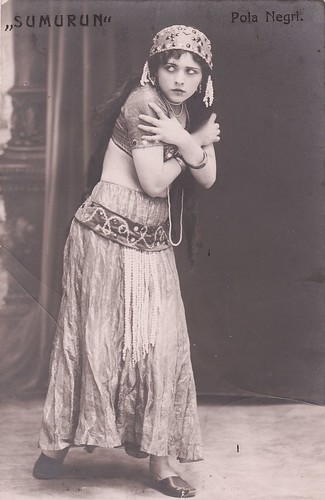
Polish postcard. Photo: publicity still for the play Sumurun. Collection: Marlene Pilaete.
Polish film actress Pola Negri (1894-1987) achieved notoriety as a femme fatale in silent films between 1910s and 1930s.
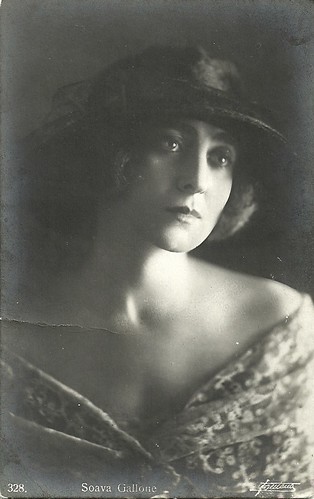
Italian postcard by Ed. A. Traldi, Milano, no. 328. Photo: Fontana.
Polish actress Soava Gallone (1880-1957) was one of the divas of the Italian silent cinema.
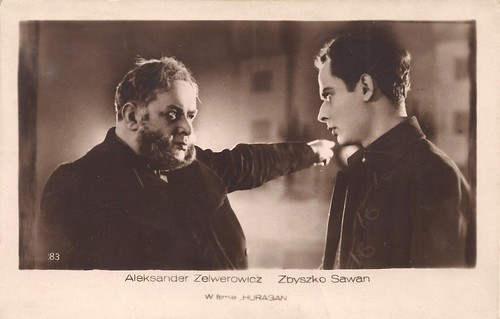
Polish postcard, no. 83. Photo: publicity still for Huragan/Hurricane (Joseph Lejtes, 1928) with Zbyszko Sawan and Aleksander Zelwerowicz. Collection: Joanna.
Aleksander Zelwerowicz (1877-1955) was a Polish actor, director, theatre president and a teacher. He received the Order of Polonia Restituta, one of Poland's highest Orders. He is also one of the Polish Righteous among the Nations, recognised by Yad Vashem as non-Jews who saved Jews from extermination during the Holocaust.
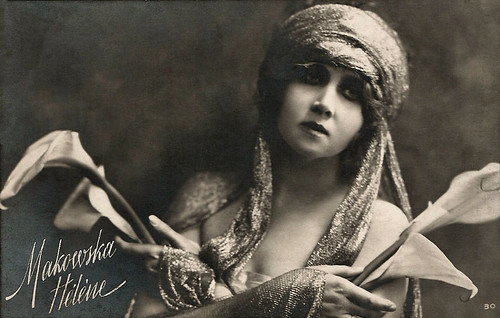
Italian postcard, no. 30. Collection: Didier Hanson.
Polish singer and actress Helena Makowska (1893-1964) was a beautiful diva of the Italian silent cinema in the 1910s. During the 1920s she moved to Berlin and also became a star of the German cinema.
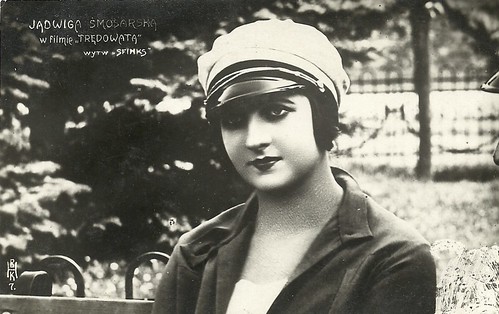
Polish postcard by BHK, no. 7. Photo: Sfinks. Publicity still for Tredowata/The Leper (Boleslaw Mierzejewski, Edward Puchalski, 1927). Collection: Didier Hanson.
Jadwiga Smosarska (1898-1971) was the biggest star of the Polish cinema of the pre-WW II era. From 1919 on, the Polish actress made more than 25 silent and sound films. She also was very successful on stage. When the Nazis invaded Poland in 1939, she fled to the US. In 1970, she returned to Poland.
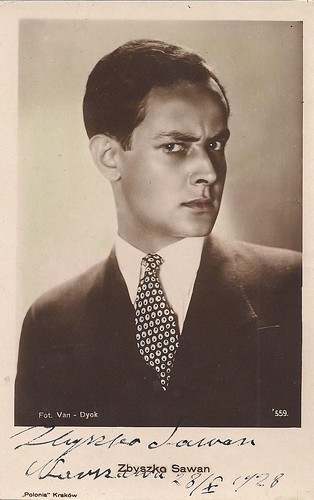
Polish postcard by Polonia, Krakow, no. 559. Photo: Van Dyck. Signature from 1928. Collection: Joanne.
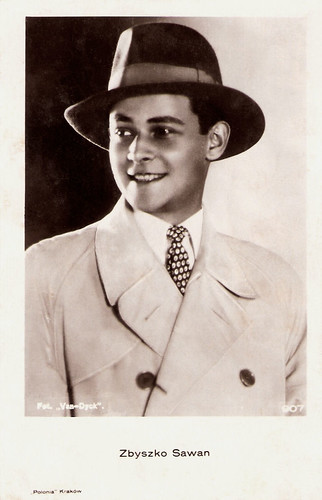
Polish postcard by Polonia, Krakow, no. 907. Photo: Van Dyck.
Polish actor Zbigniew (or Zbyszko) Sawan (1904–1984) starred both in silent and sound films, and was also a respected stage actor in his country. He also worked as a theatre director and manager.
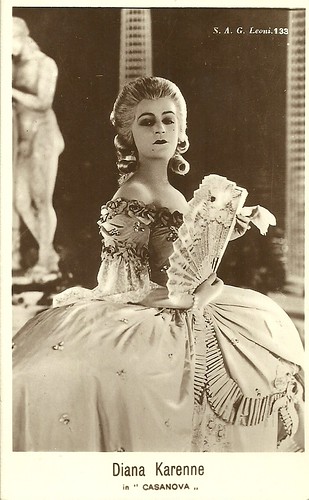
Italian postcard by G.B. Falci, Milano. Distr. S.A.G. Leoni, No. 133. Diana Karenne as Maria, Duchess de Lardi in French-German coproduction Casanova (Alexander Volkoff, 1927), partly shot on location in Venice.
Polish-born actress Diana Karenne (1888-1940) was one of the divas of Italian silent cinema.

Austrian postcard by Iris Verlag, no. 625. Photo: Sascha.
Handsome and athletic Austrian-Polish actor Igo Sym (1896-1941) played classy gentlemen, aristocrats and army officers in Polish, Austrian and German films of the 1920s. After the German Invasion of Poland he decided to co-operate with the Nazis and in 1941 he was killed by members of the Polish resistance movement.
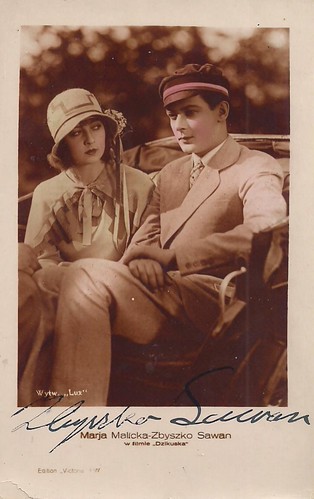
Polish postcard by Edition Victoria. Photo: Lux. Publicity still for Dzikuska/Savage (Henryk Szaro, 1928) with Marja Malicka and Zbyszko Sawan. Collection: Joanna.
Polish actress Maria or Marja Malicka (1900-1992) appeared both in silent and sound films. She was married to Zbigniew Sawan.
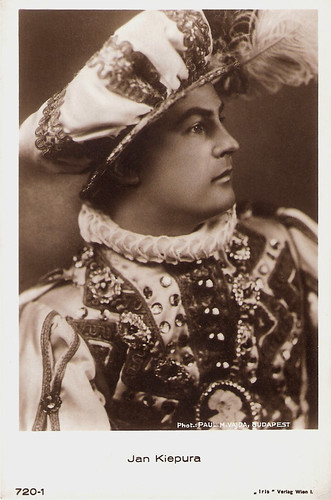
Austrian postcard by Iris-Verlag, Wien, no. 720-1. Photo: Paul M. Vajda, Budapest.
Polish actor and singer Jan Kiepura (1902-1966) was one of the grand tenors of the 20th century and with his handsome smile he also became a popular film star. He made his film debut in the silent Polish film O czym sie nie mysli (Edward Puchalski, 1926). Solo and together with Marta Eggerth he starred in many popular film operettas of the 1930s.
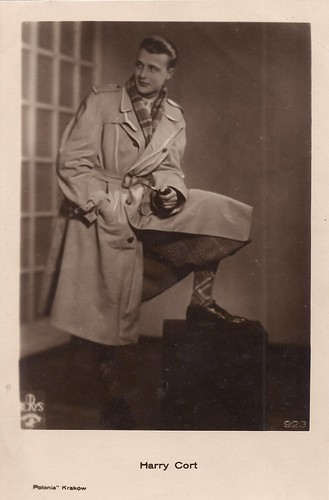
Polish postcard by Polonia, Krakow, no. 923. Collection: Joanna.
Polish actor Harry Cort (1905-?) came from a royal dynasty and had a short film career with starring roles in three silent films, 9:25. Przygoda jednej nocy (1929), Halka (1930) and Karuzela zycia (1930).
Source: Le Giornate del Cinema Muto.

Polish postcard. Photo: publicity still for the play Sumurun. Collection: Marlene Pilaete.
Polish film actress Pola Negri (1894-1987) achieved notoriety as a femme fatale in silent films between 1910s and 1930s.

Italian postcard by Ed. A. Traldi, Milano, no. 328. Photo: Fontana.
Polish actress Soava Gallone (1880-1957) was one of the divas of the Italian silent cinema.

Polish postcard, no. 83. Photo: publicity still for Huragan/Hurricane (Joseph Lejtes, 1928) with Zbyszko Sawan and Aleksander Zelwerowicz. Collection: Joanna.
Aleksander Zelwerowicz (1877-1955) was a Polish actor, director, theatre president and a teacher. He received the Order of Polonia Restituta, one of Poland's highest Orders. He is also one of the Polish Righteous among the Nations, recognised by Yad Vashem as non-Jews who saved Jews from extermination during the Holocaust.

Italian postcard, no. 30. Collection: Didier Hanson.
Polish singer and actress Helena Makowska (1893-1964) was a beautiful diva of the Italian silent cinema in the 1910s. During the 1920s she moved to Berlin and also became a star of the German cinema.

Polish postcard by BHK, no. 7. Photo: Sfinks. Publicity still for Tredowata/The Leper (Boleslaw Mierzejewski, Edward Puchalski, 1927). Collection: Didier Hanson.
Jadwiga Smosarska (1898-1971) was the biggest star of the Polish cinema of the pre-WW II era. From 1919 on, the Polish actress made more than 25 silent and sound films. She also was very successful on stage. When the Nazis invaded Poland in 1939, she fled to the US. In 1970, she returned to Poland.

Polish postcard by Polonia, Krakow, no. 559. Photo: Van Dyck. Signature from 1928. Collection: Joanne.

Polish postcard by Polonia, Krakow, no. 907. Photo: Van Dyck.
Polish actor Zbigniew (or Zbyszko) Sawan (1904–1984) starred both in silent and sound films, and was also a respected stage actor in his country. He also worked as a theatre director and manager.

Italian postcard by G.B. Falci, Milano. Distr. S.A.G. Leoni, No. 133. Diana Karenne as Maria, Duchess de Lardi in French-German coproduction Casanova (Alexander Volkoff, 1927), partly shot on location in Venice.
Polish-born actress Diana Karenne (1888-1940) was one of the divas of Italian silent cinema.

Austrian postcard by Iris Verlag, no. 625. Photo: Sascha.
Handsome and athletic Austrian-Polish actor Igo Sym (1896-1941) played classy gentlemen, aristocrats and army officers in Polish, Austrian and German films of the 1920s. After the German Invasion of Poland he decided to co-operate with the Nazis and in 1941 he was killed by members of the Polish resistance movement.

Polish postcard by Edition Victoria. Photo: Lux. Publicity still for Dzikuska/Savage (Henryk Szaro, 1928) with Marja Malicka and Zbyszko Sawan. Collection: Joanna.
Polish actress Maria or Marja Malicka (1900-1992) appeared both in silent and sound films. She was married to Zbigniew Sawan.

Austrian postcard by Iris-Verlag, Wien, no. 720-1. Photo: Paul M. Vajda, Budapest.
Polish actor and singer Jan Kiepura (1902-1966) was one of the grand tenors of the 20th century and with his handsome smile he also became a popular film star. He made his film debut in the silent Polish film O czym sie nie mysli (Edward Puchalski, 1926). Solo and together with Marta Eggerth he starred in many popular film operettas of the 1930s.

Polish postcard by Polonia, Krakow, no. 923. Collection: Joanna.
Polish actor Harry Cort (1905-?) came from a royal dynasty and had a short film career with starring roles in three silent films, 9:25. Przygoda jednej nocy (1929), Halka (1930) and Karuzela zycia (1930).
Source: Le Giornate del Cinema Muto.
No comments:
Post a Comment